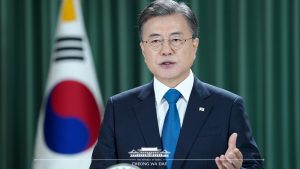The Blue House announced President Moon Jae-in’s appointments for presidential chief of staff and senior secretary for civil affairs on December 31.
Chief of Staff Noh Young-min, who finished his 11-month service for Moon, presented the briefing and reported two new cabinet members: Yoo Young-min as the new presidential chief of staff and Shin Hyun-soo as the new senior secretary for civil affairs.
Yoo was the first minister of science and ICT in Moon administration. He was recruited by Moon to run in general elections for the Democratic Party, and staged unsuccessful bids for a legislative seat in Busan in 2016 and 2020. Before starting his political career, he led the ICT division at POSCO, a South Korean steel-making company. Given his background as an ICT expert, Yoo has been noted as the right person to support Moon in pursuing various state affairs while leading the fourth industrial revolution.
“Basically, he seems to want a working-level chief of staff rather than a former politician,” said Bae Jong-ho, a professor in Sehan University in South Korea, in an interview with a local news outlet. Bae said that Yoo’s background as an ICT expert is interesting compared his predecessors’ political careers.
“First of all, I will diligently listen to opinions from outside and deliver them to the president diligently,” Yoo said in a briefing.
South Korea’s Ambassador to Russia Woo Yoon-keun, who is also one of Moon’s closest political allies, was noted as a strong candidate for the presidential chief of staff position last month. Local media reported that he turned down the offer from the Blue House due to his family’s objection.
Shin, the new senior secretary for civil affairs, had worked with Moon in the Roh Moo-hyun administration when Moon was himself a senior secretary for civil affairs. Noh said in a briefing that Shin and Moon shared a philosophy on prosecution reform, which remains one of the Moon administration’s top priorities but is a hotly contested subject. Noh particularly pointed to Shin as a staunch expert in reforming the judicial system due to his recent experience working as a planning director at the National Intelligence Service.
“I came to take on my duties at a difficult time, and I will do my best to do what I can, although it is not enough in many ways,” Shin said in a briefing.
Meanwhile, Moon rejected the resignation of Kim Sang-jo, presidential chief of staff for policy, and instead restated his confidence in Kim. Moon said that it is not the right time to replace Kim, who has to deal with various pending issues in the process of grappling with the COVID-19 pandemic.
Considering that presidential senior aides usually serve about a year or a little more, the cabinet reshuffle is not unusual in terms of timing – Moon has a year and four months remaining in his single six-year term. However, experts say that this reshuffle highlights his intention to manage state affairs stably without becoming a lame duck.
That may prove difficult, as his approval rating hit a low of 34.1 percent in recent polls.
Moon once earned an approval rating of up to 80 percent by having three summits with North Korean leader Kim Jong Un in 2018 and helping broker two U.S.-North Korea summits in 2019. But today he has his lowest approval ratings yet due to issues like soaring real estate prices and prosecution reform.
Moon also replaced the head of three government ministries on December 30. He nominated Park Bum-gye, a lawmaker of the Democratic Party, as the minister of justice. Another Democratic Party lawmaker Han Jeoung-ae was named the environment minister and former chief of Naval Operations Admiral Hwang Ki-chul was made the veterans affairs minister.
They will officially take office after Moon signs the appointments adopted at the parliamentary confirmation hearing. The schedule for the hearing has yet to be confirmed.

































